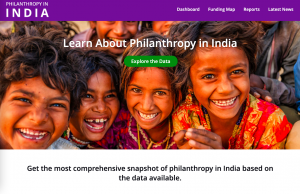Candid, in partnership with the Centre for Social Impact and Philanthropy (CSIP), has launched Philanthropy in India, an innovative website that provides the most comprehensive information available on Indian philanthropy. The new database will allow anyone to access the website and discover extensive funding data to support India’s social sector – a new development for Indian philanthropy.
 India is home to one of the fastest-growing social sectors in the world. Yet, despite its growth in recent years, the overall size, contribution, and impact of philanthropic activity in India remains mostly unknown. Candid’s Philanthropy in India website aims to address this void. The website includes a dashboard that gives a high-level snapshot of where funding is going; a funding map that shows in-depth data; reports, insights, and other resources that highlight philanthropic work in India.
India is home to one of the fastest-growing social sectors in the world. Yet, despite its growth in recent years, the overall size, contribution, and impact of philanthropic activity in India remains mostly unknown. Candid’s Philanthropy in India website aims to address this void. The website includes a dashboard that gives a high-level snapshot of where funding is going; a funding map that shows in-depth data; reports, insights, and other resources that highlight philanthropic work in India.
‘The lack of reliable data on Indian philanthropy hampers decision-making and prevents the effective allocation of scarce resources. This has been particularly in evidence during the COVID-19 pandemic,’ said Ingrid Srinath, CSIP Director.
‘CSIP is pleased to support this pioneering effort to address this long-standing lacuna. While the data are still far from complete, we hope this initiative will lead to greater transparency from philanthropists, aid strategic choices and encourage the study of philanthropy in India.’
Key findings from Philanthropy in India
From 2015 through 2018, Candid identified over 155,000 grants serving India totalling about $10.7 billion and tracked 11,004 grants in bi/multilateral aid totalling $14.1 billion. Key findings, based on the available data, include:
- Corporate donors, overwhelmingly based in India, funded the majority of grants.
- The top foundation funders who are supporting programs in India are based outside India.
- Private donors invested most heavily in health (30 per cent), education (21 per cent), and community and economic development (20 per cent)
- More than 70 percent of bi- and multilateral aid was designated for the community and economic development subject area.
‘There is still much more to learn about philanthropy in India, and funders can help. When funders share their grants data with Candid, it helps them elevate their work, creates a fuller picture of the social sector, and ultimately, better supports Indian philanthropy. We invite all funders to submit their grants data,’ said Zohra Zori, vice president of networks at Candid.
Visit Philanthropy in India at india.candid.org. Funders can share their grants data here.



Comments (0)